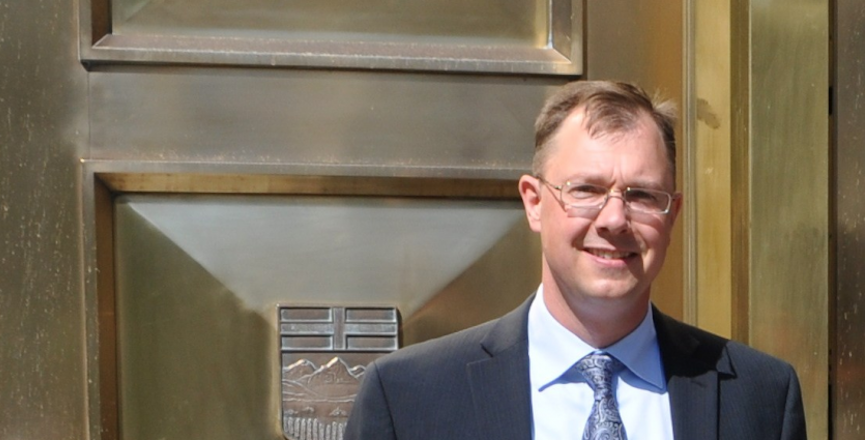What were John Carpay and the so-called Justice Centre for Constitutional Freedoms he heads trying to achieve when they hired a private detective to snoop on the chief justice of the Manitoba Court of Queen’s Bench?
The JCCF founder and president admitted yesterday it was his organization that hired the professional peeper to spy on the judge, who is presiding over a case conducted by the JCCF on behalf of seven rural Manitoba churches that object to public health orders made earlier in the COVID-19 pandemic.
The Calgary-based lawyer, for many years a friend and close political ally of Alberta Premier Jason Kenney, made the admission after Chief Justice Glenn Joyal revealed during a hearing into the JCCF’s case that he had been followed by a private detective.
Justice Joyal called the surveillance cause for serious concern about the privacy and safety of judges, and said such activities could be perceived as obstruction of justice.
Following public officials on fishing expeditions for evidence of improper behaviour is a distasteful but probably inevitable by-product of the social media era — as Premier Kenney and his dining companions discovered to their dismay early last month when an unknown photographer in a nearby office building snapped them breaking COVID-19 rules on the rooftop patio of Edmonton’s notorious Sky Palace.
But you just don’t go around trying to get the goods on a superior court justice, whatever you may imagine the goods may be. It should be obvious this is especially true if you are a lawyer appearing before the same judge in a legal case!
The JCCF may not have intended to intimidate the judge or interfere with the course of justice, but it has certainly managed to give that impression to a lot of people, judging from what is being said on social media.
For Carpay personally, this is potentially a very serious matter. It’s hard to imagine that the Law Society will just shrug its collective shoulders and say no harm, no foul.
According to the CBC’s very thorough coverage of the story, Carpay explained the engagement of the investigator was a part of an unrelated JCCF effort to hold senior officials accountable. He told the court the JCCF’s investigators were following a number of public officials to see if they were breaking health regulations. He said following Justice Joyal was not related to the JCCF’s litigation before him. He said no other judges were spied on. He said hiring the private investigator was his own decision. He said other JCCF lawyers knew nothing about it. He said the JCCF’s clients also knew nothing about it. And he apologized for making an error in judgment.
Carpay made the same points again yesterday in a statement published on the JCCF’s website.
It would be a much more serious matter, of course, if some thought had been given to try to influence the course of justice, a natural line of speculation under the circumstances that doesn’t require a particularly suspicious or unreasonable mind.
And since the JCCF recently defended the pastor of a church that defied COVID-19 restrictions in the Edmonton area, it’s also fair to ask, as James Bremner of Calgary did on Twitter this morning, if the organization “undertook any of these shenanigans in our province.”
I have written in the past in connection with Carpay’s inflammatory comparison of the Pride flag to the Nazi swastika banner that he is an intelligent man who gives considerable thought to what he says and how he says it.
But what he could have been thinking in this case is difficult to fathom. To describe the situation that came to light yesterday as the result of an error of judgment is a considerable understatement.
What could the JCCF have hoped to gain from this kind of outrageous behaviour? Perhaps we’ll eventually know more. Winnipeg Police are said to be investigating. That the results of their investigations should be revealed in the fullness of time is clearly in the public interest.
In 2018, Premier Kenney ludicrously compared Carpay to American civil rights icon Rosa Parks, best known for her pivotal role in the Montgomery, Alabama, bus boycott of 1955 and 1956. Last spring, however, the pair appeared to fall out over pandemic restrictions, with Carpay sharply criticizing Alberta’s COVID-19 rules as “an unscientific experiment.”
The JCCF is one of a number of right-wing activist organizations that have been granted charitable status by the Canada Revenue Agency.
The organization claimed in its 2016 annual report to be supported by more than 2,500 individual donors. That annual report now seems to have been removed from the JCCF website.
In a section of the JCCF website entitled Donor Recognition, however, the organization still says it has received “generous support” from the Aurea Foundation, the Lotte & John Hecht Memorial Foundation, and the Donner Canadian Foundation. These three Canadian charitable foundations are all also supporters of the Fraser Institute.
All donations are confidential, the JCCF website says, and donors are only acknowledged with permission.
A story on the JCCF published by the North 99 website in 2018 noted that the Washington-based Atlas Network, a worldwide conduit for right-wing cash, featured the JCCF on the list of Canadian organizations it supported. However, the JCCF is no longer shown on that Atlas web page.
Surely in light of the genuinely shocking developments in court yesterday, is it is not unreasonable to say that the need is urgent for a serious official look at right-wing charitable organizations like the JCCF, how they are funded, and the sources of their funding, including foreign sources.
David Climenhaga, author of the Alberta Diary blog, is a journalist, author, journalism teacher, poet and trade union communicator who has worked in senior writing and editing positions at The Globe and Mail and the Calgary Herald.
Image: Justice Centre for Constitutional Freedoms/Distributed



